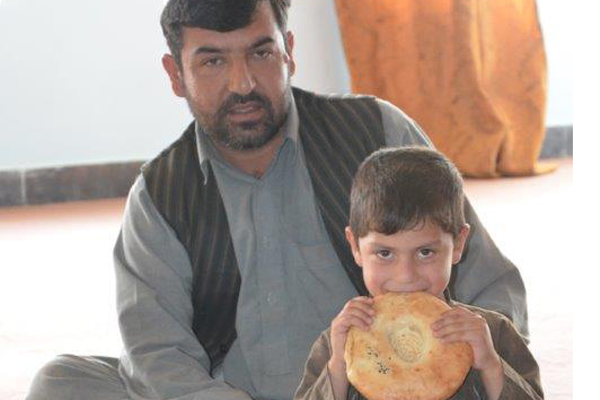WFP Begins Humanitarian Assistance To Families Fleeing Kunduz Fighting

KABUL - The United Nations World Food Programme (WFP) is providing food assistance to people displaced by the recent upsurge of fighting in Afghanistan’s northern province of Kunduz.
Today, WFP started distributing enough food for a month to more than 150 families who fled to the city of Mazar-e-Sharif, while food is being dispatched for nearly 950 families displaced to Taluqan city in Takhar province. Earlier this week, more than 3 metric tons of food was distributed via the Afghanistan National Disaster Management Authority (ANDMA) to displaced families in Mazar.
WFP has provided emergency supplies of wheat flour fortified with vitamins and minerals to ANDMA which contracted bakeries to make bread for displaced people. So far 1,800 people in a camp in Mazar-i-Sharif have received bread. Additional wheat is being milled in anticipation of increased needs in the coming days.
Assessments of humanitarian need among the displaced are ongoing in northern cities including Mazar-i-Sahrif, Poul-e-Khumri, Taluqan and Faizabad, and WFP has pre-positioned enough food stocks for up to 12,000 affected families.
WFP is seriously concerned about the safety and food security of people remaining in Kunduz, as fighting intensifies. “WFP is assessing the situation in coordination with other humanitarian partners, and we are ready to extend our assistance to Kunduz as soon as the security situation allows us access,” said Angelline Rudakubana, Deputy Country Director and Officer-in-Charge for WFP in Afghanistan.
“Right now, we have the capacity to provide one-month of rations to approximately 12,000 families in the region. This will, however, require a diversion of resources from our existing programmes, and we are urgently looking to donors to fill the gap,” she said.
Between the outbreak of fighting on 28 September and the closure of the Kunduz Airport two days later, WFP helped evacuate nearly 200 aid workers and their families to safety via the UN Humanitarian Air Service (UNHAS) in coordination with the UN Assistance Mission in Afghanistan (UNAMA).
WFP is funded entirely by voluntary contributions and the crisis in Kunduz comes as the agency struggles with an existing budget shortfall for WFP in Afghanistan. US$30 million is urgently required to help remote communities and displaced people in the country prepare for winter, when food traditionally becomes scarce.
In 2015, WFP Afghanistan plans to assist 3.9 million vulnerable Afghans in all 34 provinces of the country with food assistance through various projects, including assets creation, school meals, vocational skills training and nutrition support.
# # #
WFP is the world's largest humanitarian agency fighting hunger worldwide, delivering food assistance in emergencies and working with communities to improve nutrition and build resilience. Each year, WFP assists some 80 million people in around 80 countries.
WFP Afghanistan operates a feedback hotline number and welcomes comments, complaints and feedback regarding the distribution of WFP food assistance. The hotline number is: 0790-555-544
For photos, please contact WFP’s Head of the Photography Unit, Rein Skullerud:
Rein.Skullerud@wfp.org
Follow us on Twitter @WFP_Media @WFP_Asia
For more information please contact (email address: firstname.lastname@wfp.org):
Keiko Izushi, WFP/Kabul, +93(0)706-004-885
Wahidullah Amani, WFP/Kabul, +93(0)706-004-884
Damian Kean, WFP/Bangkok, +66817019208
Jane Howard, WFP/Rome, Tel. +39 06 65132321, Mob. +39 346 7600521
Bettina Luescher, WFP/Geneva, Tel. +41 22 917 8564, Mob. + 41-79-842-8057
